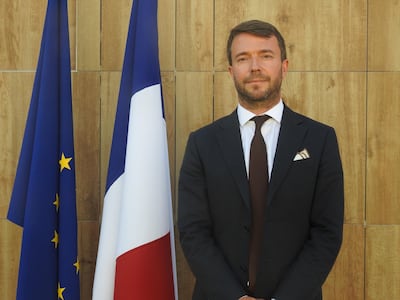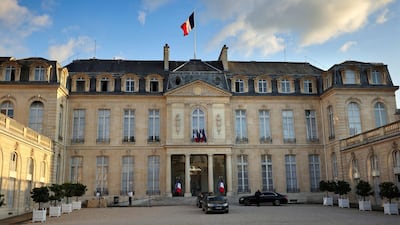French energy companies are in discussions to develop hydrogen projects in the UAE, as Opec's third-largest producer looks to decarbonise its economy, according to the European country's ambassador to the Emirates.
"We are working, at the moment, with several of the key stakeholders in this country – whether they are corporates or governments – on developing co-operation in the field of hydrogen," Xavier Chatel said in an interview with The National.
French energy companies such as Total, which recently rebranded itself to TotalEnergies, as well as EDF and Engie are big players in developing conventional and renewable power infrastructure in the UAE.
TotalEnergies operates some of the largest oil and gas concessions in Abu Dhabi with state-run Adnoc. France's EDF is developing one of the largest solar photovoltaic plants in the world.
EDF Renewables is part of a consortium – with UAE entities Masdar and Taqa and China's JinkoPower – that is developing a 2-gigawatt solar PV project in Abu Dhabi's Al Dhafra region.
EDF is also developing the 800-megawatt third phase of the Sheikh Mohammed bin Rashid Al Maktoum solar park in Dubai.
"There is a great deal of interest in photovoltaic but there is also a great deal of interest in hydrogen, which is an area in which we are also investing a lot," said Mr Chatel.
The French government is dedicating €7 billion ($8.3bn) of its €100bn economic recovery plan announced last year towards hydrogen investments.
A third of the overall recovery plan unveiled in September last year will be dedicated towards "ecological transition".
The European country is also looking to reach net carbon neutrality by 2050 in line with the Paris Agreement, which looks to cap global warming at 1.5°C (34.7 degrees Fahrenheit) to 2°C above pre-industrial levels.
"We were able to commit, to cutting our greenhouse gas emissions by 75 per cent by 2050, and I know that UAE also has important plans," said Mr Chatel.

He was speaking ahead of e-Fusion, a French industry event to promote the country's nuclear industry.
France meets 70 per cent of its electricity needs from nuclear power. The UAE recently added its Barakah Nuclear Power Plant to the national grid.
French companies are looking at possible synergies with UAE-based atomic power entities such as the Emirates Nuclear Energy Corporation.
"We have something like 56 nuclear reactors in the country. [They] provide 70 per cent of our energy. It is very long experience and I think it is unlike any other civil nuclear country," he said.
"And I think it is an experience that is also respected in many countries, and that includes the UAE."
Mr Chatel, who held meetings with the chief executives of Enec and the Federal Authority for Nuclear Regulation, said there is a "great deal of respect" in the UAE for his country's nuclear expertise.
France has looked to develop inroads into nuclear technology in the Middle East.
EDF, the biggest nuclear player in France, has previously expressed interest in developing Saudi Arabia's ambitious atomic power programme.
In an interview with The National in 2019, EDF chairman and chief executive Jean-Bernard Levy said the company was preselected to potentially work with Saudi Arabia's nuclear programme.
Saudi Arabia plans to add 17 gigawatts of nuclear capacity by 2040. The kingdom is looking to bring two reactors with a combined capacity of 3.2 gigawatts online within the next decade.


